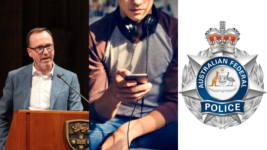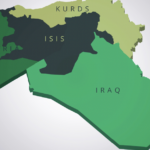AFP Radicalise Troubled Autistic Child Then Charge Him With Terrorism Offences

The Victorian Children’s Court heard last October that, after his parents attended a Victoria police station in April 2021 seeking assistance, a 13-year-old autistic boy, who’d developed an obsession with the Islamic State, was radicalised by law enforcement and entrapped into committing terrorism offences, rather than assisted onto the right path.
The boy, who was given the pseudonym Thomas Carrick despite his non-English background, was provided with some countering violent extremism (CVE) support, however at the same time, the Joint Counter Terrorism Team (JCTT), comprised of AFP, ASIO and VicPol agents, radicalised him.
Australian Federal Police deputy commissioner Ian McCartney authorised a major control operation against the boy, who has an IQ of 71, which involved an online covert operative communicating with Carrick, under two different personae to deceive him into partaking in terror discourse and planning.
The JCTT operative pretended to be a local Muslim man and a more extreme personality who was supposed to be overseas, and it was the latter, who, over 55 days of communications, suggested the 13-year-old might like to build a bomb or murder an AFP officer.
During a hearing on Monday, Greens Senator David Shoebridge grilled the AFP deputy head regarding the motivations of officers who tricked a boy into contemplating terror acts.
Yet, with the unconvincing responses from the AFP, the constituency is now left to speculate on why police sought to produce a terror suspect.
The work of terrorists
The Guardian reported last Saturday, that the Victorian Children’s Court heard in October last year that on having radicalised the boy, via the covert extremist persona suggesting several forms of terrorism offences to perpetrate, officers from the terror unit then waited until he turned 14 to arrest him.
The teenager was then taken into custody in October 2021. And waiting for his 14th birthday was a strategic move on the part of federal police, as it’s harder to argue the position that a child is too young to be considered criminally responsible for their actions, after they’ve turned 14 years of age.
JCTT officers then charged the autistic 14-year-old with two terror offences and held him on remand for three months, prior to releasing him on bail. And the court subsequently determined to place a permanent stay on the charges, with the transcript of the findings only being released last week.
“The community would not expect law enforcement officers to encourage a 13–14-year-old child towards racial hatred, distrust of police and violent extremism – encouraging the child’s fixation on ISIS,” said NSW Local Court Magistrate Lesley Fleming.
“The conduct engaged in by the JCTT and the AFP falls so profoundly short of the minimum standards expected of law enforcement offices [sic] that to refuse this [stay] application would be to condone and encourage further instances of such conduct.”
The thin blue line
At about 10 minutes into a meeting of the Parliamentary Joint Committee on Law Enforcement on 5 February, Shoebridge quizzed McCartney as to why he authorised a controlled operation against a 13-year-old autistic boy, “when his family came to the police for help”.
The AFP deputy said the “decision was not taken lightly” but “there were a set of exceptional circumstances”. The operation was launched “due to the escalation of threat” and “the need to protect the community”. And he noted that the CVE strategy ran parallel to the criminal inquiry.
McCartney stressed it was important to provide context, which, as has been discussed by ASIO head Mike Burgess over recent years, the nation has an issue with youths becoming radicalised online and “predominantly, unfortunately, with mental health being a factor”.
“The court found that it was the AFP that was radicalising the child,” the senator said to the deputy commissioner. “The radicalisation was happening as a result of the actions of your own officers. Do you accept the magistrate’s finding?” And the AFP officer said his agency had accepted the ruling.
Shoebridge then asked McCartney if anybody had been held to account, including himself or the undercover operatives, with the AFP officer countering this line of questioning with the assertion that the teenager had long been radicalised prior to his involvement in the case.
The senator went on to respond that “it was the AFP, who recommended he become a sniper and a suicide bomber”.
Manufacturing terror
ASIO director general Mike Burgess has been raising the dramatic escalation in the amount of young people participating in online extremist discussions and becoming radicalised as a result of them, which saw a sharp spike over the 2020-2021 COVID pandemic period.
Yet, this increase is not only significant due to the steep rise, but it’s also notable as those falling under the influence of extremist ideas more recently, have not been youths interested in Islamic fundamentalism, rather it’s more so been those with a focus on white supremacy.
Burgess told a Senate estimates hearing in May last year, that over the previous seven years, online neo-Nazi activity has risen from 5 percent of the nation’s chief domestic spying agency’s counterterrorism work to 30 percent at the time he was making the announcement.
After close to two decades of fears regarding the threat of Islamic domestic terrorism, which, for the most part, was unfounded and, at times, could be regarded as a manufactured scare campaign on the part of the authorities in the wake of the 9/11 terror attacks in New York City in 2001.
Indeed, in the wake of the atrocities in the Big Apple, the UN General Assembly adopted resolution 1373, which called on all state parties to enact terrorism offences in domestic law and see that they were accompanied with appropriate stiff sentences.
As the Australian government was not hindered by any federal human rights protections, it went to town with the UN suggestion, and around 100 pieces of counterterrorism-national security legislation have been passed, with bipartisan approval, over the last two decades since.
And these laws, which are supposedly geared to combatting terrorism, have actually served to erode the rights of all citizens and residents.
Of course, it’s well documented that after events like 9/11, the fallout can see authorities, as well as public actors, demonising sectors of the community that appear similar to the terror suspects, to the point that the corresponding extra scrutiny results in unjust investigations and convictions.
And the recent AFP terror suspect revelations have all the hallmarks of a well-oiled western law enforcement agency producing officers with the ability to unconsciously manufacture terror suspects in order to justify the enhanced control that authorities have bestowed upon themselves.







